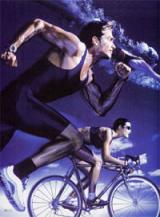
5ht February 2009 - Press release
These results were published in January in the prestigious journal Thorax

Although physical exercise has beneficial effects for all, even those diagnosed with Chronic Obstructive Pulmonary Disease (COPD), a new study warns that levels of oxidative stress much higher than those at rest conditions may occur in the leg muscles of patients with severe and very severe COPD. The study was carried out in collaboration with Dr. Esther Barreiro’s group at the Municipal Institute of Medical Research (IMIM-Hospital del Mar), together with Dr. Joaquim Gea, head of the Pneumology service at the Hospital del Mar and with Dr. Josep Roca, Director of the Lung Function Unit at the Hospital Clínic-IDIBAPS.
According to Esther Barreiro, the first author of the article who received the annual award for research in the field of Chronic Obstructive Pulmonary Disease (COPD) in 2008: “The importance of the increase in the levels of oxidative stress in these muscles is that this is one of the clearly implicated factors of improper peripheral muscle function in patients with severe COPD. If these levels in the muscles are increased as a result of an endurance exercise programme, the situation may be seriously aggravated, leading to an even more significant limitation of these individuals’ stress tolerance.”
The objective of the study was to look at the muscular oxidative stress in the quadriceps of 22 individuals (15 with severe COPD and 7 healthy individuals who served as a control). The physical activity for the study was done on a stationary bike for an hour a day, five days a week, with a duration of three weeks. Data was collected before and after the individuals were submitted to the exercise programme; biopsies were taken from the quadriceps muscle to analyse the different molecular markers of oxidative stress.
Among the most important discoveries of the study is the fact that the lower the stress was on the quadriceps muscle and the lower the patients’ exercise capacity, the higher the levels of muscular oxidative stress. However, the excess of oxidative molecules in the patients’ muscles gave way to the oxidation of very important proteins that are involved in the metabolism of glucose in energy reserves and muscle contraction.
In another study recently published in Free Radical Research in which the same researchers participated, together with researchers from the Hospital de Cruces in Barakaldo, it was shown that magnetic stimulation of the quadriceps muscle is a good therapeutic alternative in passive muscle training for individuals with severe COPD and limitations on exercise. The patients improve their stress capacity (measured with the incremental shuttle walking test) while the fibril sizes of the quadriceps also increased after 8 weeks of applying the magnetic stimulation to both their quadriceps. Conversely, and in relation to the previous study, repeated intense muscular contractions applied with the magnetic stimulator for 8 weeks did not affect any increase in the levels of oxidative stress in these muscles. In this sense, muscular magnetic stimulation is presented as a good therapeutic tool for the treatment of muscular dysfunction in patients with advanced COPD and diminished exercise capacity.
Reference articles: “Chronic endurance exercise induces quadriceps nitrosative stress in patients with severe COPD” Thorax 2009; 64; 13-19. DOI:10.1136/thx.2008.105163 “Redox balance following magnetic stimulation training in the quadriceps of patients with severe COPD”. Free Radical Research. Nov-des 2008;42 (11-12);939-948. DOI:10.1080/10715760802555569
Servei de Comunicació:
Marta Calsina Freixas(ELIMINAR)
Tel:
(+34) 93 316 06 80
Doctor Aiguader, 88
08226 Barcelona
© Institut Hospital del Mar
d'Investigacions MèdiquesLegal Notice and Privacy Policy | Cookie Policy | Site Index | Accessibility | Find Us | Contact